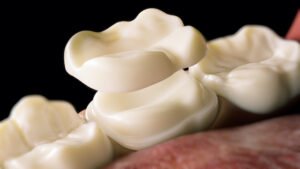
Your smile’s a veritable beacon of self-confidence, and a dental crown can be quite the valuable ally.
Your smile’s a veritable beacon of self-confidence, and a dental crown can be quite the valuable ally in protecting/preserving it against whatever life throws your (…mouth’s) way. These custom-made caps are like little knights in shining armor for your teeth, restoring their strength, form, and functionality.
But remember, acquiring a dental crown is just the beginning of the journey. To keep those pearly whites shining bright for all the world to see, you will indeed have to master the art of dental crown maintenance.
Read along below to learn precisely how.
Understanding the Types of Dental Crowns
First, let’s get familiar with the different types of dental crowns available:
- Ceramic Crowns: Crafted from porcelain or ceramic materials, these crowns closely mimic the color and clarity of natural teeth. They’re a top choice for front teeth, thanks to their aesthetic appeal.
- Gold Alloy Crowns: These crowns are a blend of gold, copper, and other metals.
- Base Metal Alloy Crowns: Made from non-noble metals, they resist corrosion and are robust enough to handle substantial “bite force.”
- Porcelain-Fused-to-Metal Crowns: These crowns consist of a metal shell with a porcelain layer fused to the outside. They’re solid and durable, making them suitable for both front and back teeth.
Crown Care 101
Now that you’re an expert on all the varieties, let’s delve right into proper dental crown care practices:
- Maintain Good Oral Hygiene: Brush your teeth at least twice a day and floss at least once daily. This routine helps remove plaque and food particles that can lead to decay and damage to your crown.
- Steer Clear of Hard or Sticky Foods: To avoid damaging or dislodging your crown, skip the hard candies, nuts, ice, and chewing gum. Stick to foods that won’t put your crown at risk.
- Protect Your Crown During Physical Activities: If you play sports or grind your teeth at night, consider wearing a mouthguard. This simple step can shield your crown from potential damage.
- Regular Dental Checkups: Don’t skip your dental appointments. Regular checkups and cleanings help maintain the health of your teeth and gums, and your dentist can keep an eye on your crown for any signs of wear or damage.
- Don’t Chomp on Hard Objects!: Refrain from using your teeth to bite or chew on hard objects like pens, pencils, or bottle caps. Doing so can cause harm to your crown.
- Practice Excellent Oral Hygiene: Continue your good oral hygiene habits, including brushing, flossing, and rinsing with an antiseptic mouthwash.
- Address Issues Promptly: If you (e.g.) experience sudden significant discomfort or notice chips or cracks in your crown, don’t delay—contact your dentist immediately.
Dealing with a Lost Crown
Ever had the misfortune of feeling a dental crown “pop” right out, possibly while enjoying vehemently enjoying a favorite food or (eep!:) at a fancy dinner party? Losing a crown is a fairly common problem that many people are forced to face—and yes, it can be painful, not to mention embarrassing. Should this occur, your dentist will be able to advise you on what exactly to do in the short (or rather, immediate) term, and get you booked schedule an appointment for you t have the crown replaced.
As for the interim between crown loss and replacement, here’s a handy set of guidelines:
- Seize the Crown: If a crown falls out, welp, try to retrieve it if possible. Handle it carefully and avoid touching the inside of the crown (which has been fitted to your tooth).
- Examine the Tooth: Next, examine the tooth carefully to make sure it’s intact and damage-free. If the tooth is damaged, contact your dentist right away.
- Clean the Crown: If it’s dirty or has debris, clean it carefully with a soft-bristled toothbrush and water—no harsh chemicals/cleaners.
- Keep the Whole Area Clean: While you await the dentist’s chair, maintain a sparkly mouthspace! Keep up with the brushin’ and flossin’. For now, be extra mindful to avoid any foods that could dislodge the crown or damage the tooth underneath.
- Don’t Try to Reattach the Crown Yourself: -It won’t go well. Please avoid using glue or other materials to reattach the crown, as this can damage the crown and/or harm your tooth.
- Pay a Visit to Your Pals at the Dental Office: During your appointment, your dentist will examine the tooth and crown to ensure it fits correctly and is not damaged. If necessary, your dentist may need to replace the crown. (If the tooth is sensitive or painful, you can take over-the-counter pain medication, like ibuprofen, as directed on the label.)
Catonsville Dental Care Is The Best Choice for Your Dental Health
Catonsville Dental Care offers a wide variety of services when it comes to oral health. We have the experience and understanding to diagnose and treat any problem you have as quickly and painlessly as possible. With four dentists available at our office and a commitment to comfort, safety, and relaxation, you can’t find a better provider for your health. We look forward to helping you keep your smile perfect all year long and talking with you about your needs. To schedule an appointment or consultation, visit us online or give us a call at 410-747-1115. For more tips and tricks, follow us on Facebook, Flickr, Twitter, and YouTube.
